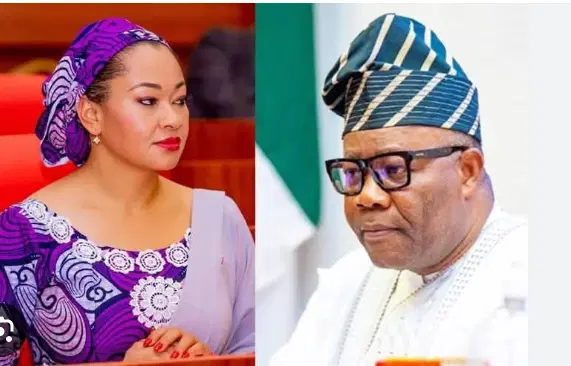The Federal High Court Judge, Justice Binta Fatima Nyako has issued an order restraining all parties involved in a legal suit filed by suspended Senator Natasha Akpoti-Uduaghan from making public statements or granting press interviews regarding the case. The directive, which came on Friday, April 4, 2025, is aimed at preserving the integrity of the ongoing judicial process.
The suit in question pits Senator Akpoti-Uduaghan against the President of the Senate, Godswill Akpabio, alongside three other defendants, in a case of sexual harassment allegations made by Natasha against Akpabio.
The judge’s order was prompted by concerns raised by Akpabio’s legal counsel, Kehinde Ogunwumiju (SAN). Ogunwumiju argued that the plaintiff, Senator Akpoti-Uduaghan, had been engaging in a media tour, appearing on various television stations to discuss matters directly related to the pending case. This, he contended, risked prejudicing the judicial process and undermining the court’s authority.
Read also: Rivers Administrator halts all tenders, procurement, demands refunds
Justice Nyako, in her ruling, emphasized the need for all parties to refrain from actions that could influence public perception or interfere with the fair adjudication of the matter. The order applies not only to Senator Akpoti-Uduaghan but also to Senator Akpabio and the other defendants, ensuring that none of the involved parties can use the media to sway opinion while the case remains sub judice—under judicial consideration.
This development underscores a broader principle in legal proceedings: the importance of maintaining neutrality and avoiding external influence until a court delivers its verdict. By barring press interviews, Justice Nyako said he seeks to protect the sanctity of the judicial process, ensuring that the case is decided based on evidence and legal arguments presented in court rather than narratives shaped in the public domain.
For now, the parties must comply with Justice Nyako’s order or risk facing contempt of court charges. The ruling serves as a reminder of the delicate balance between freedom of expression and the demands of justice, particularly in cases that attract widespread public interest. As the legal battle unfolds, Nigerians will be watching closely—though, for the time being, they will have to wait for the court’s final decision rather than rely on televised soundbites for insight into the dispute.
